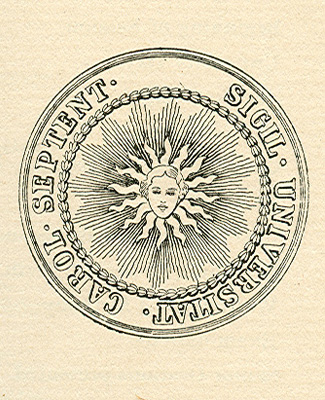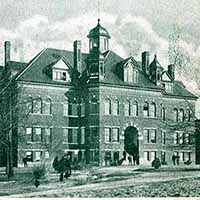1865 | 1867 | 1870 | 1873 | 1875| 1876| 1879| 1880| 1881| 1882 | 1884| 1885| 1886| 1887| 1889| 1891 | 1892 | 1894| 1895 | 1896 | 1897 | 1899 | 1900
1865
-
Theology classes for Freedmen, organized by Henry Martin Tupper, developed into a school called Raleigh Institute. In 1875 this Baptist-affiliated school was incorporated as Shaw University, the name it retains today.
1867
-
Scotia Seminary, later called Scotia Women's College, was established to educate black women entering the fields of education and social work. In 1930 it merged with Barber-Scotia Memorial College of Anniston, Alabama and adopted its current name.
-
This historically black school in Charlotte, North Carolina, which currently operates as a four-year college, was originally named Biddle Memorial Institute. The school's name was later changed to recognize significant donations made by the Smith family.
-
The college was established in Raleigh, North Carolina, by Episcopal ministers for the purpose of educating Freedmen.
-
Originally named Thomasville Female College, this school moved to Highpoint, North Carolina in 1889 and became Highpoint Female College. It closed in 1893.
-
First established as the Howard School for the education of Black Americans in 1867. In 1877, the state legislature established the school as a training institute for Black teachers called the State Colored Normal School and later Fayetteville State Teachers College. In 1969 the school took its present name and is today a four-year liberal arts university.
1870
-
Known originally as Oak Hollow Academy and then Rutherford Academy, the school merged with another Methodist institution, Weaver College to become Brevard College in 1934.
1873
-
Established in Warnersville with the help of the Methodist Episcopal Church, the original site of the school was purchased by emancipated Black people. What began as a co-educational institution is now a four-year college for women.
1875
-
Southwood College
-
Established in 1875 as a private school for girls called Salem Academy, the campus later housed Pineland School for Girls, Pineland Junior College, Edwards Military Institute and finally Southwood College, which closed in 1973.
1876
-
Affiliated with the Roman Catholic Church and the Order of Saint Benedict, the school was originally called St. Mary of Help. It is in operation today as a four-year college in Belmont, North Carolina.
1879
-
Zion Wesley Institute was established in Concord, North Carolina, to train A.M.E. Zion ministers. Shortly thereafter it closed, relocated to Salisbury and opened as Zion Wesley College. It became Livingstone College in 1887, and remains a four-year private college.
1880
-
The school was established by the Evangelical & Reformed Church to educate young women. It closed somewhere between 1915 and 1916.
1881
-
Conover High School, established by the Lutheran Synod, was located in Conover, North Carolina. It later became Concordia High School and then Concordia College. After buildings were destroyed in a 1933 fire, the school did not reopen.
1882
-
Kinston College
-
The school was established in Kinston, North Carolina, in 1882 and closed just nine years later.
-
The school established as Central Institute for Young Ladies, later became Littleton Female College. The school was not rebuilt after buildings were destroyed in a 1919 fire.
1884
-
Gaston College
-
Gaston College in Dallas, North Carolina, emerged out of Gaston High School. Originally co-educational, in 1889 it became Gaston College for Girls. The school closed in 1905.
1885
-
The Oberlin Home and School in Lick Mountain, North Carolina, was one of many schools founded by Miss Emily C. Prudden. It later became the Ebenezer Mitchell Home and School and relocated to Lenoir before finding its current home in Misenheimer. It became Mitchell Junior College, then Pfeiffer Junior College and finally Pfeiffer University, a four-year institution.
1886
-
The school was affiliated with the African Methodist Episcopal Church and remained open until 1974 or 1975.
1887
-
Baptist minister James Archibald Campbell founded Buies Creek Academy in Harnett County, North Carolina. The school later became Buies Creek Junior College and then was renamed Campbell Junior College, after its founder. In 1979 it was renamed Campbell University.
-
North Carolina College of Agriculture and Mechanic Arts opened in 1887 as a land-grant college. The school acquired the name State College before becoming North Carolina State University at Raleigh in the 1960s.
-
Croatan Normal School was founded to train American Indian public school teachers. After many name changes and a move to its current Pembroke location, the school eventually became part of the state university system as University of North Carolina at Pembroke.
1889
-
Elon College was founded by the Christian Church (now the United Church of Christ) in Mills Point, North Carolina. The town was later renamed Elon, and the school became Elon University in 2001.
-
In an effort to educate the young and train teachers, Cullowhee Academy was established. After becoming the four-year institution called Western Carolina Teachers College, the school added programs in other areas of study and in 1967 became Western Carolina University.
1891
-
What began as a two-year normal school to train African American teachers developed into the four-year college known as Elizabeth City State Teachers College. In 1969 the school became part of the state university system and took its current name.
-
Four Lutheran Pastors established the co-educational school Highland Academy. Shortly thereafter the school's name was changed to Lenoir College and in 1923 changed again to Lenoir-Rhyne College. In 2008 it achieved university status.
-
North Carolina State Normal and Industrial School was established to train women educators, and in 1932 was renamed Woman's College of the University of North Carolina. In 1963 the school began admitting men, joined the state university system and took its current name.
-
The Agricultural and Mechanical College for the Colored Race was established as a land-grant institution in Greensboro, North Carolina. In 1915 the school's name was changed to The Agricultural and Technical College of North Carolina and in 1967 it officially became a "university," joining the state university system in 1972.
-
Although chartered in 1891, Baptist Female University opened 1899 in downtown Raleigh, North Carolina. In 1909 the school's name was changed to its current one in honor of Thomas Meredith, the man who originally conceived the idea of establishing the college.
1892
-
Sacred Heart Academy was founded by the Roman Catholic Sisters of Mercy in Belmont, North Carolina, as a Catholic finishing school for girls. The school developed into a four-year college, and closed its doors in 1987.
-
Simon Green Atkins established the Slater Industrial Academy, which later became Winston-Salem Teachers College, the first African American college in the country to award degrees in elementary teacher education. In 1972 the school became part of the state university system.
1894
-
The Asheville Farm School was established by Women's Board of Home Missions of the Presbyterian Church to educate boys in rural communities. It later merged with the Dorland-Bell School for girls to become a coed secondary school named Warren H. Wilson Vocational Junior College and Associated Schools. In 1967 it became a four-year college.
1895
-
The school was established when two Methodist colleges, Weaver College and Rutherford College, merged on the campus formerly owned by Brevard Institute.
1896
-
The Fayetteville Presbytery founded Red Springs Seminary, a school for girls, in Red Springs, North Carolina. The name changed to Southern Presbyterian College and Conservatory of Music, and then to Flora Macdonald College. Although the college closed in 1961, a college preparatory day school called Flora MacDonald Academy is now housed on the college's former campus.
-
Wingate College was established by the North Carolina Baptist Association in Wingate, North Carolina. It became a four-year college in 1977 and a university in 1995.
1897
-
The school was established in Charlotte, North Carolina, as a four-year Lutheran institution for women. In 1915 the school was moved to Virginia to merge with the Roanoke College for Women; however, a fire in 1921 resulted in its permanent closure.
1899
-
Watauga Academy was founded to train teachers in Northwest North Carolina. In 1929, the school became a four-year institution called Appalachian State Teachers College and in 1967 was renamed Appalachian State University.
1900
-
In 1899 Presbyterian minister Edgar Tufts began teaching small groups of young people in the town of Banner Elk. His efforts eventually blossomed into Lees-McRae College, which currently operates as a four-year private college.

